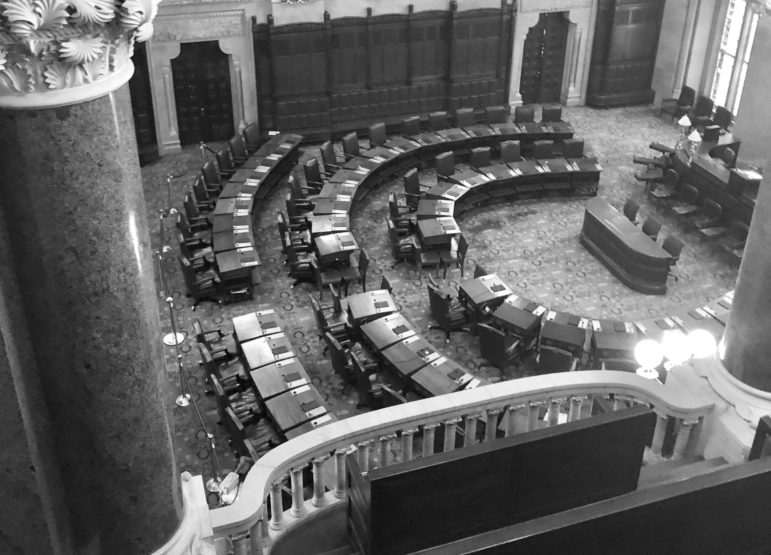
Eagledj
The State Senate chamberThe State Senate and Assembly voted Thursday to approve a bill to create a $100 million fund to pay rents for people who have lost income because of the COVID-19 crisis.
The measure, authored by Sen. Brian Kavanagh of Manhattan and Assemblymember Steven Cymbrowitz of Brooklyn, both Democrats, would cover people who were paying more than 30 percent of their income in rent, had lost income between April 1 and July 31 of this year, and made less than 80 percent of Area Median Income (or about $81,920 for a family of three.)
The money would be paid out to building owners as a voucher to cover the gap between 30 percent of the tenant’s income and 125 percent of “fair market rent,” a federal measure.
The measure passed the Senate by a vote of 61-0 and the Assembly by a 98-45 margin. It now heads to Gov. Cuomo.
Even as hospitalization rates fall and the pace of new cases slackens, the economic consequences of COVID-19 are just beginning to register. By some counts, one in four tenants failed to pay their rent in May.
The relief bill would rely on emergency federal funding that has flowed to the state. While capped at $100 million, the amount of funding available for vouchers could be less than that, since the legislation taps into CARES Act funds “that have not otherwise been obligated.”
This measure represents a different approach from the other policies and proposals that have emerged since the coronavirus crisis began.
In March, Cuomo imposed an eviction moratorium that protects tenants from being thrown out of their homes over a five-month period but does not prevent their overdue rent from accumulating during that time. What’s more, the revised version of the moratorium, which the governor issued earlier this month, restricts protections to narrower group of renters. (The legislature passed a year-long moratorium on Wednesday that now awaits the governor’s signature.)
At Mayor de Blasio’s instruction, the Rent Guidelines Board has given preliminary approval to a freeze on rents in the city’s 950,000 rent-stabilized apartments. That would prevent those rents from rising over the next year but doesn’t relieve tenants from paying their current rent, nor affect the 880,000 non-regulated apartments in the city.
A more ambitious proposal—rent cancellation—would have erased rent altogether for qualifying tenants, over a short period of time, but that has met with little success in Albany, in part because property owners have argued that they cannot shoulder the burden for the pandemic’s economic fallout.
The real-estate lobby, led by the Real Estate Board of New York, supports the creation of a voucher system. In fact, some landlord advocates, like the Rent Stabilization Association, have argued for years that a taxpayer-funded voucher system would be preferable to one that promotes affordability by limiting the rent landlords can charge.
Some tenant advocates mounted protests on Thursday urging votes against the Kavanagh measure. A statement from the #CancelRent movement says the protests were to “urge the state legislature to vote against a landlord bailout bill that fails to help millions of struggling tenants who can’t afford to pay rent.”
Critics of the voucher bill say it has far too few strings attached: no anti-discrimination provisions, upkeep requirements, specific language addressing the homeless or the undocumented, or measures to limit speculation.
“Private equity firms are ready to use the ‘once-in-a-lifetime opportunity created by the pandemic’ to deploy $328 billion in ‘dry powder’ to buy up distressed real estate,” wrote Community Service Society housing analyst Oksana Mironova. “To avoid another speculative wave of investment into New York’s rental market, any kind of action to stabilize the multifamily housing market, including rental assistance, must include checks and balances to minimize speculation.” (CSS is a former owner of City Limits that provides operating support.)
The temporary nature of the measure is also a concern—it would operate until July 2021 or the money runs out. Past temporary voucher programs, like Mayor Bloomberg’s Advantage program, are not remembered fondly. Kavanagh and Cymrowitz had before the crisis proposed a permanent voucher program.










5 thoughts on “Rent Relief Bill Approved in Albany”
What about Rent Control apartments. Can you please always include us in with rent stabilized apartments and specify rent controlled as well. Our rents are not cheap and many of our apartments are falling a apart . Remember the 5.9% in crease for 2 years in a row and then the 7% increase for 2 years in a row. We need help!!!!’
What about rent controlled apartments . Please specify us as well when you fight for rent stabilization. Our apartments are not cheap . And are often falling apart . Remember the rent increases of 5.9% 2 years in a row and then 7% 2 years in a row, my rent went up over 1,000 dollars. We need to be included I’m not young and I’ have no income.
I have a 5 family house and live in one apartment- for real estate taxes I am lumped in with the LeFraks etc-
If I loose one tenant I am in the red as my RE taxes are 84K a year.
The rent laws should have a1-6 family category.
Also, the City needs to reassess every building in the City- all of the house on my block are essentially the same, and taxes range from $5500 K to$90K
How can we apply?
I would like to know how to apply for rent relief?